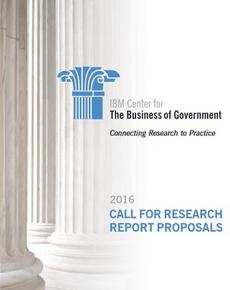
New Research Report Recipients

We are pleased to announce our latest round of awards for new reports on key public sector challenges, which respond to priorities identified in the Center's research agenda. Our content is intended to stimulate and accelerate the production of practical research that benefits public sector leaders and managers.
We expect the following reports to be published later in 2017. Short summaries of each report follow:
Realizing the Promise of Cognitive Computing Systems: An Implementation Guide and Capability Maturity Model for Government - By Kevin Desouza, Arizona State University.
This proposal focuses on the development and evolution of Cognitive Computing Systems (CCSs) as a key enabler of the evolving concept of “cognitive government.” This project seeks to conduct an analysis of CCSs focusing on:
1. understanding the emerging role of CCSs within public agencies and the potential implications,
2. appreciating their potential to enable agencies to increase performance and optimize resource allocations,
3. charting pathways towards adopting, experimenting with, and implementing these systems; and,
4. developing a maturity model to guide agencies seeking to invest in the development of CCSs.
The report will document lessons learned from several of ongoing projects that include elements of CCSs, and collect case studies on various CCSs projects in the public sector. The results of this research will provide a viable definition of "Cognitive Government" based on the application of CCSs within the delivery of public sector missions.
Dollars and Sense: Transforming Procurement Based on Lessons from the U.K.- By Anne Laurent, Consortium for Advanced Management International
Federal agencies are on the cusp of implementing and benefiting from a government-wide procurement initiative that is based on commercial experience called "category management", but most agencies do not yet have plans for applying category management to their own procurements as a general practice. The lessons learned from examining tools, processes and achievements of the U.K. government's 10-year category management procurement transformation can drive greater adoption of and value from the U.S. initiative.
This study will analyze and make accessible the U.K.'s experience, pointing to methods and precedents that can be leveraged by U.S. government agencies. In addition, the author will explore the innovation enabled because of savings realized from the pursuit of category management. The author will also identify effective strategies for applying category management to increase efficiency in procuring common goods and services, and point out where this approach may not always be consistent with best value for complex procurements.
Opportunities and Challenges in Promoting Innovation with Open Data - By Luis Felipe Luna-Reyes, University of Albany.
This report will focus on the efforts of US federal agencies to promote open data, seeking to answer questions about current advancements of government open data policy. The analysis will yield a set of practical recommendations for the new administration, contributing to the furtherance of open data efforts and potential next steps. The research will be guided by the following questions:
- What are the current results and successes of the open data policy in the US?
- What are the main enablers and barriers to promoting effectiveness and innovation through opening government data?
- What are the main recommendations for the coming administration to continue and strengthen open data initiatives?
The author will also compare the US experience with include international case studies to drawing lessons learned, best practices, and insights on how open data initiatives can best impact citizens.
New Zealand’s “Better Public Services Results Programme” – by Rodney Scott, visiting fellow at the Harvard Ash Center For Democratic Governance and Innovation and adjunct professor at the Australia and New Zealand School of Government and the University of New South Wales; and Ross Boyd, Principal Policy Analyst, New Zealand State Services Commission
New Zealand led the world in government reforms in the 1980s and 1990s with radical ideas for making government more performance-based through the use of contracts between agency heads and government ministers. But by the mid-2000s, it became clear that this approach discouraged collaboration between agencies in tackling major social issues that could not be resolved by any single agency but only through joint efforts. In 2012, the government announced a five-year initiative to achieve measurable progress in ten areas requiring interagency collaboration, such as reducing long-term unemployment and increasing high school graduation rates. This initiative, called the “Better Public Services Results Program,” was seen by 2016 as so successful, that the government committed to setting another ten goals for the next five years. This report will describe what New Zealand did to get agencies to work collaboratively in achieving common goals, what worked, and best practices that could be employed by other governments interested in adapting this approach to their country.



